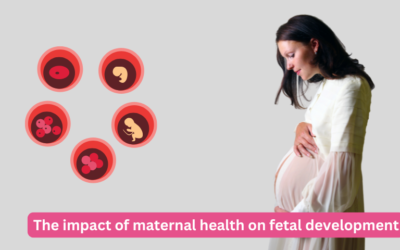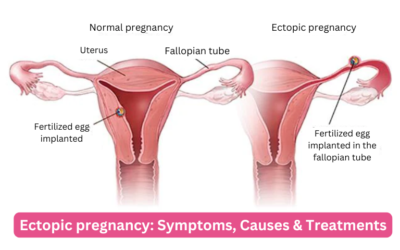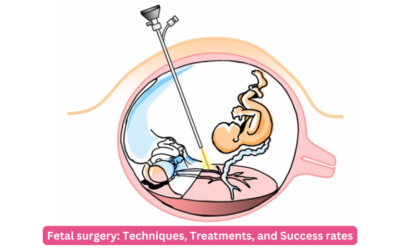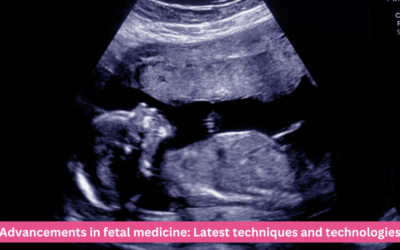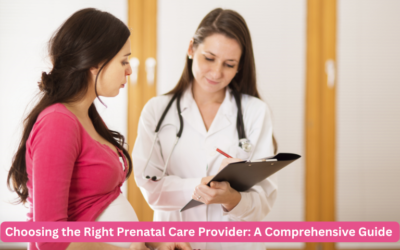What is Non-Stress Testing (NST)?
Non-Stress Testing or NST, is a non-invasive procedure used to monitor the heart rate of the fetus. It evaluates the baby’s heart rate in response to its movements, providing information about the baby’s well-being. This test is often recommended when a healthcare provider wants to assess the health of the fetus in cases where there may be concerns regarding growth, gestational age, or potential complications.
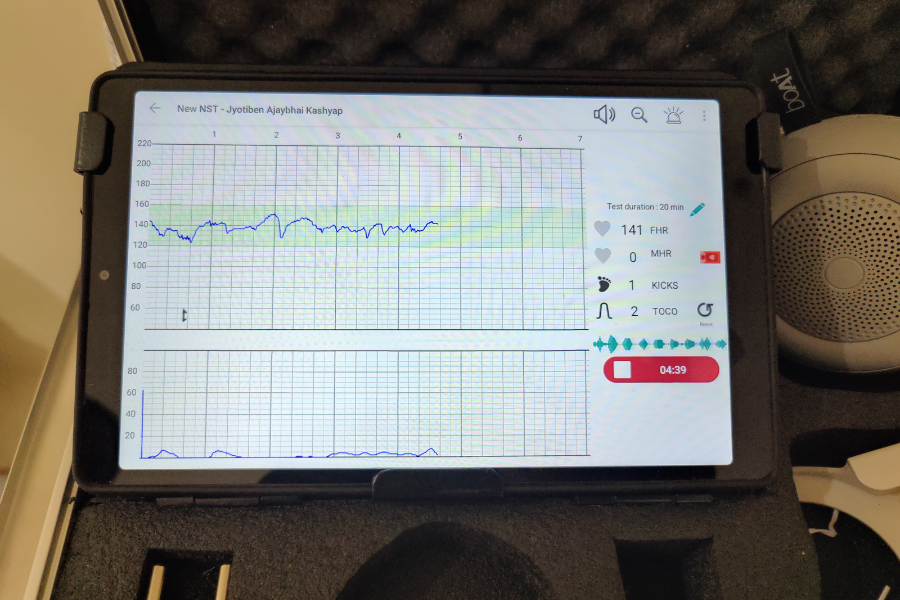
Purpose of NST
The purpose of Non-Stress Testing is to assess the fetal heart rate in response to fetal movements. This helps healthcare providers evaluate the baby’s well-being and identify any signs of fetal distress or compromised oxygenation. It is often used to monitor the health of the fetus during high-risk pregnancies or when there are concerns about fetal growth or development.
Who needs NST?
Non-Stress Testing may be recommended for various reasons, including:
- High-risk pregnancies: For mothers with certain medical conditions such as diabetes, hypertension, or kidney disease, an NST helps monitor fetal well-being.
- Post-dates pregnancy: If a pregnancy goes beyond the expected due date, NST can be used to evaluate fetal health.
- Growth concerns: If there are concerns regarding the fetus’s growth or weight, an NST can provide additional insights into the baby’s well-being.
- Complications or Abnormalities: Pregnancies that involve complications like placental insufficiency or fetal growth restriction may warrant an NST for closer monitoring.
- Certain medical conditions: Mothers with conditions like preeclampsia or gestational diabetes may have an NST as part of their routine prenatal care.
Benefits of NST
- Early detection of fetal distress: NST provides valuable insights into the baby’s well-being and allows for early detection of potential issues such as fetal distress, which can prompt timely intervention if necessary.
- Non-invasive: Unlike other tests, NST is non-invasive and poses minimal risk to both the mother and the fetus.
- Informed decision making: The test helps healthcare providers make informed decisions about labor and delivery, ensuring the safest possible environment for childbirth.
How NST is Conducted?
During an NST, you will be asked to lie down in a comfortable position. A healthcare provider will attach two straps to your abdomen using elastic belts. One strap monitors the fetal heart rate, and the other records uterine contractions. The test typically lasts between 20 to 30 minutes.
Preparation for the Test
- Clothing and Hygiene: Wear loose, comfortable clothing. Avoid using lotions or creams on your abdomen as they may interfere with the fetal monitoring equipment.
- Dietary Restrictions: Eat normally and hydrate well before the test. A well-fed and hydrated fetus is more active, which can give better results during the test.
- Scheduling: Schedule the test in advance by contacting Shukan Hospital & IVF Centre. If you have a referral, you can coordinate with our medical team to arrange the test at a convenient time.
Results Interpretation
- Normal Results: A normal NST result shows fetal heart rate variability in response to fetal movements, which typically indicates a healthy, well-oxygenated fetus.
- Abnormal Results: An abnormal NST result might suggest a need for further assessment or intervention. This could involve additional tests or monitoring to ensure the baby’s health.
Why choose Shukan Hospital & IVF Centre in Ahmedabad for Non-Stress Testing (NST)?
- Our team of obstetricians and healthcare providers are highly trained and experienced in managing prenatal care and specialized tests like NST.
- We use advanced equipment and technology to conduct NST procedures, ensuring accurate and reliable results.
- We prioritize patient comfort and satisfaction, providing a warm and welcoming environment during every stage of the test.
- Our approach includes not just conducting the NST, but also offering guidance, support, and counseling to help you understand the results and make informed decisions about your pregnancy journey.
FAqs
What is a normal NST value?
A normal NST result typically shows a baseline fetal heart rate of 110 to 160 beats per minute. The test will also demonstrate variability in the fetal heart rate, meaning the heart rate fluctuates within a range. Additionally, the fetal heart rate should accelerate with fetal movements, indicating a responsive and healthy baby.
Is the test painful?
No, NST is painless and non-invasive.
Can I eat or drink before the test?
Yes, you can eat and drink normally before the test.
What happens if the test results are abnormal?
An abnormal result may prompt further monitoring or intervention, such as additional tests or medical evaluation.
How often should I undergo an NST during my pregnancy?
The frequency of NSTs can vary based on your pregnancy’s specific circumstances and your healthcare provider’s recommendations. It’s best to consult with your healthcare provider to determine a suitable schedule.
What if my baby doesn’t move during the NST?
Movement of the fetus can vary, and sometimes babies are more active at different times of the day. If the baby is not as active, the healthcare provider may have you reposition or wait for a short period to allow the baby to move.
Is there any risk associated with an NST?
NST is a safe and non-invasive procedure. There are no known risks to the mother or fetus. It poses minimal risk, and there are no side effects associated with the test.
Can I continue my daily activities before the test?
Yes, you can carry out your regular daily activities before the test. Just make sure you have eaten and are well-hydrated before the test for optimal results.
What happens if the NST results are inconclusive?
If the NST results are inconclusive, your healthcare provider may recommend additional monitoring, such as a more extended NST or other tests, to gather more information about the baby’s well-being.
How long does it take to receive the results?
The results of an NST test are usually interpreted immediately. Your healthcare provider will discuss the results with you and, if needed, suggest further actions or interventions.
Can I drive home after the NST test?
Yes, you can drive yourself home after the NST test unless advised otherwise by your healthcare provider. The test is non-invasive and poses no restrictions on your ability to perform daily activities.
What if I have a high-risk pregnancy?
If you have a high-risk pregnancy, your healthcare provider may recommend more frequent NSTs to monitor fetal well-being and adjust care as needed.
How does an NST differ from other fetal monitoring tests like a biophysical profile (BPP)?
An NST primarily monitors the fetal heart rate in response to movements, whereas a biophysical profile (BPP) provides a more comprehensive assessment of fetal health, including movement, muscle tone, breathing, and amniotic fluid levels. Your healthcare provider may recommend one or both tests based on your pregnancy’s needs.
Can I take a shower or bath before the NST test?
Yes, you can take a shower or bath before the NST test. Just make sure to avoid using lotions or creams on your abdomen, as they can interfere with the monitoring equipment.
What if my baby is asleep during the NST?
If the baby is asleep during the NST, the healthcare provider may ask you to change positions, move around, or drink some cold water to encourage fetal movement.
Can NST be performed more than once during a pregnancy?
Yes, NST can be performed more than once during a pregnancy, especially if there are concerns about fetal well-being or high-risk factors.
Is there anything that can affect the accuracy of the NST test?
Factors such as maternal movement, fetal sleep cycles, or maternal position changes can potentially affect the accuracy of the test. Healthcare providers take these variables into account when interpreting the results.
Is NST suitable for all pregnancies?
NST is generally safe and suitable for most pregnancies. However, certain high-risk pregnancies or specific medical conditions may require additional monitoring or alternative testing. Your healthcare provider will determine the best approach for you.
Can I have an NST if I am on bed rest?
Yes, you can have an NST while on bed rest. Your healthcare provider may adjust the testing process or schedule to accommodate your condition.
Meet Our Specialists

Dr. Ajay Prajapati
MBBS (Bachelor of Medicine, Bachelor of Surgery), MS (Master of Surgery)
Specialities: IVF, Infertility, Fetal medicine
Experience: 10+ years
Language: English, Hindi, Gujarati
- Over a decade of hands-on experience in fertility and pregnancy challenges.
- Expert in advanced laparoscopy for minimally invasive surgeries.
- FOGSI-certified sonologist, ensuring accurate pregnancy assessments.
- Known for successful outcomes and trusted care in high-risk cases.
- Earned patient trust across Gujarat and beyond

Dr. Hardik Savaliya
MBB, DGO
Specialities: IVF, Male Infertility, Female Infertility
Experience: 5+ years
Language: English, Hindi, Gujarati
- Holistic approach to patient care, providing both medical treatment and emotional support.
- Focuses on empowering women with knowledge about their health.
- Expertise in infertility treatments like IVF, IUI, and other assisted reproductive technologies.
- Successfully treats couples with infertility issues.
- Competent in managing high-risk pregnancies, ensuring safety for mother and baby.
- Skilled in minimally invasive surgeries, offering effective solutions with quicker recovery times.
- Holds MBBS and DGO degrees, with in-depth knowledge in gynecology and obstetrics.

Dr. Payal Patel
MBBS, MD (Obstetrics & Gynecology), Fellowship in Advanced Ultrasonography course, Fellowship in Infertility, Endoscopy & Ultrasonography
Specialities: Obstetrician, Gynecologist and Infertility Specialist
Experience: 6+ years
Language: English, Hindi, Gujarati
- Expert in managing complex gynecological issues.
- Provides comprehensive infertility treatments.
- Known for a patient-centered approach with personalized care.
- Compassionate and dedicated to her patients’ well-being.
- Stays updated with the latest advancements in her field.
Testimonials
Blogs related to Obstetrics
Fetal Growth Monitoring: Why it’s crucial during pregnancy?
Pregnancy is a journey of immense joy and responsibility, where the health and growth of your unborn baby become a top priority. Among the many...
Understanding HCG levels in pregnancy
Human Chorionic Gonadotropin (HCG) is a key hormone that plays a vital role in early pregnancy. Often called the "pregnancy hormone," HCG is...
Anemia and Pregnancy – What every woman should know?
Pregnancy is a life-altering experience, full of joy and excitement, but also filled with challenges and adjustments. Among the various health...
How does your body change during pregnancy?
Pregnancy is one of the most profound experiences a woman can go through, both physically and emotionally. As your body prepares to bring a new life...
How to deal with white discharge during pregnancy?
During pregnancy, the body undergoes many changes, some of which can be surprising or even concerning if you're not familiar with them. One common...
Tests during pregnancy: What are the routine prenatal tests?
Pregnancy is an exciting journey, but it can also bring a lot of questions and concerns for expecting parents. One important aspect of prenatal care...
The impact of maternal health on fetal development
Maternal health plays a crucial role in ensuring a healthy pregnancy and optimal fetal development. From the moment of conception, the health of the...
Understanding the fetal anatomy scan: What to look for?
Pregnancy is an incredible journey filled with milestones that ensure the health and well-being of both the mother and baby. One such important...
Ectopic pregnancy: Symptoms, Causes & Treatments
Ectopic pregnancy is a rare but serious condition in which a fertilized egg implants outside the uterus, most commonly in one of the fallopian...
The ethics of fetal medicine: Navigating complex decisions
Fetal medicine is a rapidly evolving field that combines advancements in technology, medical knowledge, and ethical considerations. As we strive to...
IVF and Multiple pregnancies: Understanding the risks and Benefits
In vitro fertilization (IVF) has brought hope to countless couples seeking to build families. However, one of the more complex aspects of IVF is the...
Fetal medicine and Birth planning: A professional guide to preparing for delivery
Fetal medicine plays a crucial role in modern obstetrics, offering invaluable insights into the health and development of the fetus. It enables...
Fetal surgery: Techniques, Treatments, and Success rates
Fetal surgery is a revolutionary field in medicine that addresses birth defects and other conditions while a baby is still in the womb. With...
Prenatal screening and diagnosis: Key tests and Procedures trimester by trimester
Prenatal screening and diagnostic tests are essential for monitoring the health of both the mother and baby during pregnancy. These tests help...
Advancements in fetal medicine: Latest techniques and technologies
The field of fetal medicine has experienced incredible advancements in recent years, offering pregnant women and their unborn babies more precise...
Difference between 3D and 4D sonography: Which one is right for you?
Sonography has become an integral part of prenatal care, helping expectant parents and doctors monitor the development of the fetus in real time....
15 foods and drinks to eat & avoid during pregnancy
Pregnancy is a special time that calls for extra attention to your diet. What you eat not only affects your health but also the development of your...
Understanding pregnancy trimesters: What to expect in each stage
Pregnancy is a remarkable journey, divided into three trimesters, each bringing its own set of changes, challenges, and milestones. At Shukan...
Preparing for Pregnancy: Essentials steps to take
At Shukan Hospital and IVF Center, we understand that preparing for pregnancy is an exciting and significant journey. Taking the right steps before...
Navigating the First Trimester: What to Expect
The first trimester of pregnancy is an exciting and transformative period, filled with anticipation and many changes. This phase, spanning from...
Managing Pregnancy Discomforts: Tips for Relief
Pregnancy is a beautiful journey that brings immense joy, but it also comes with its share of physical and emotional challenges. At Shukan Hospital...
Creating a Birth Plan: Your Guide to Personalized Care
Creating a birth plan is an empowering step in your pregnancy journey, allowing you to outline your preferences and make informed decisions about...
Common Pregnancy Myths: Debunking Misconceptions
We know that pregnancy is an exciting and emotional journey. With all the advice and stories you hear from friends, family, and even strangers, it...
Choosing the Right Prenatal Care Provider: A Comprehensive Guide
Choosing the right prenatal care provider is a critical decision that significantly impacts your pregnancy journey and the health of both you and...
The Art of Birthing: A Comprehensive Guide to Normal Delivery
Introduction Welcome to Shukan Hospital and IVF Center comprehensive guide to embracing natural childbirth. Welcoming a new life into the world...
Navigating Pregnancy Milestones: A Week-by-Week Guide
Introduction:Embarking on the miraculous journey of pregnancy is a momentous experience, and Shukan Hospital and IVF Centre proudly stands as your...
Unlocking the Power of Maternal Mental Health: A Path to Positive Pregnancy Outcomes
IntroductionMental health during pregnancy is a topic gaining significant attention in recent years. It's not just about the physical aspects of...
The Importance of Early Pregnancy Scans: Ensuring a Healthy Journey
Pregnancy is a uniquely special time, filled with excitement and joy.The wonder of early pregnancy is often accompanied by new feelings, new...
Fertility specialist or Gynecologist? Which is right for you?
When you are trying to conceive, it is understandable to wonder when and which doctor to consult. Patient confusion tends to originate from the fact...







